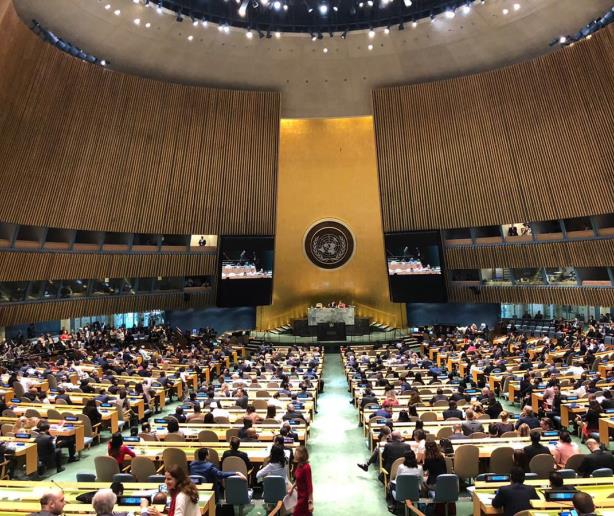The penultimate week of September can be very confusing. For some, it is the time when the last warm days of the year are experienced, which fade as the leaves fall from the trees. For others, it means preparing for the avalanche of responsibilities that inevitably arrives at the start of the last quarter of the year.
And for a very dedicated and sometimes noticeably small group, it means tuning in to what is arguably the most important week of the year for global diplomacy: the General Debate of the United Nations General Assembly.

From September 19 to 26, world leaders from around the planet gathered in the imposing hall of the United Nations General Assembly for the 78th Debate, which, contrary to what the Model United Nations would have us believe, did not It is as incendiary as its name suggests. Quite the opposite: it is one of the most precise examples of public diplomacy on an international stage.
The global event provided leaders with the opportunity to present powerful statements that, at the same time, captured the most pressing achievements and challenges of a given country.
The Dominican Republic’s speech, almost 14 minutes long and presented by President Luis Abinader, kept climate change as the central theme, alluding to how the persistence and worsening of climatological phenomena will set back the development objectives that the countries have achieved in recent decades. Another notable aspect was the inclusion of the concept of CBDRC – common but differentiated responsibilities and capabilities – a powerful climate justice term that recognizes how we can all contribute, based on our specific circumstances and limitations, to achieving a more equitable world. To emphasize this argument, President Abinader stated that the “Dominican Republic has a firm commitment that we can build a model of human development that is inclusive, fair and sustainable. However, it is legitimate to ask ourselves, are we really on our way to achieving it?” ?”
Despite its progress in the area of clean energy, the Dominican Republic took responsibility for its dependence on fossil fuels, recognizing that current needs should never serve as an excuse for anyone, much less countries, not to increase their ambitions. To illustrate this point, a call was made to all oil-producing and exporting countries to participate in a financial mechanism that guarantees the stability of crude oil prices to low- and middle-income importing countries, such as Small Island States in Development (SIDS), which are responsible for just 0.2% of global carbon emissions.
Something that stands out is how the Dominican Republic has maintained a key message in all its speeches: the need to reform the global financial system to turn it into a key ally of the most vulnerable countries in the world. At the center of this argument is the adoption of the Multidimensional Vulnerability Index (MVI), which President Abinader mentioned during the country’s speech at the 78th General Assembly:
“But many even more compelling steps are missing, among others: the adoption of the Multidimensional Vulnerability Index (MVI) applicable to all developing countries.” According to the United Nations High-Level Panel on the Development of an IVM, “all countries are vulnerable, but in different ways”, which is another important reference to the CBDRC.
Although SIDS do not constitute all of the marginalized nations in our society, they do rely more heavily on external financing to both prepare for and recover from the structural challenges induced by climate change. As a result, disaster preparedness, debt relief and infrastructure development are more difficult to achieve, and are in an unstable waltz in which Official Development Assistance (ODA) will never be enough to cover all the emergencies that these countries face throughout the year.
Why, despite the extensive funding programs available, are these funds insufficient for SIDS? The relative and, in some cases, average income of this group means that they are not eligible for the most affordable financing options, reserved for countries with the lowest incomes. This distribution model is weak in several aspects, but one stands out: how external financing does not take into account vulnerability to the aforementioned crises when disbursing funds.
Traditional measures of development, such as gross national income (GNI) per capita, do not reflect the systemic challenges and chronic vulnerabilities that climate change has exacerbated, including what it costs to offset sudden weather events and reduce their debt. By adopting the IVM, the international development ecosystem will be better equipped to use data in ways that ensure the sustainable development of SIDS and other vulnerable countries.
Echoing this point, President Abinader stated that “it is urgent to create a financing mechanism under favorable conditions so that middle-income countries can face the challenges posed by meeting the Sustainable Development Goals ( “SDG 2015-2030). The lack of access to adequate resources was precisely one of the reasons why the majority of countries failed to meet the Millennium Development Goals (MDG 2000-2015).”
Seeing how the launch of the loss and damage fund could be closely linked to the adoption of the IVM, we hope that this year’s COP28 will boost discussions on the integration of this index throughout the international financial mechanism without excluding SIDS from the help they need, and ensuring that no vulnerable country is left behind. As President Abinader declared at the end of his speech, “History will judge us not only by the words we utter in these sacred halls, but more crucially, by our actions in the realm of reality. Let us not fail the future “
This story was published on Diario Libre with the support of the Caribbean Climate Justice Journalism Fellowship, which is a joint venture between Climate Tracker and Open Society Foundations.